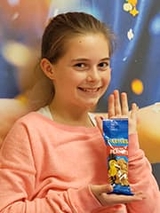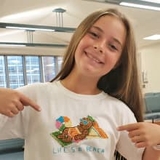Food Allergies: Grace's Story
Food Allergies: Grace's Story
Eating cake at a friend’s birthday party – it’s a common enough childhood event, but Grace, 12, could never experience it until recently. Since infancy, she has had serious allergies to milk, egg, peanuts and other nuts. Now, thanks to a breakthrough oral immunotherapy program at Children’s Hospital of Philadelphia (CHOP), she’s been desensitized to most of her food triggers and can eat almost anything.

When Grace was seven months old, her mom, Kara, gave her a first, tiny taste of ice cream. Immediately, Grace’s body swelled up and Kara realized something was seriously wrong. Her symptoms resolved with a dose of Benadryl and her pediatrician said to avoid foods with milk in them for the time being. He suggested seeing an allergist for further testing.
A few months later, Grace and her family arrived at the Food Allergy Center at CHOP for allergy testing. “Our doctor gave us a list of options and one of them was CHOP,” says Kara. “Given their reputation, it seemed like the best place to go.” The Food Allergy Center is nationally recognized as a leader in diagnosing and treating pediatric allergies.
Testing confirmed Grace had allergies to milk and egg (which she refused to ingest), as well as peanuts and tree nuts. “After the diagnosis, we looked back and could see the signs we missed,” says Kara. “Crying bouts that we thought were colic, terrible eczema; but at the time, we didn’t make the connection to food allergies.”
Armed with better knowledge, Grace followed the usual protocol for food allergies: avoidance of the trigger foods and regular check-ins with her local allergist, and having epinephrine auto-injectors available. At the time, there were few other options.
Grace did well for years, but at age 10, she began to have GI-related symptoms and returned to CHOP. She was evaluated and treated by Bridget C. Godwin, MD, an attending gastroenterologist at CHOP who has a special interest food and GI disease.
With GI symptoms controlled, the family decided to return to the Allergy team. “That’s when we saw Dr. Terri Brown-Whitehorn and it changed everything,” Kara says.
The Food Allergy team is pioneering new treatments for allergies, and brings together professionals from different disciplines to create a personalized care plan for each child.
Kara felt supported in finding ways to help Grace navigate the challenges of living with serious food allergies: avoiding exposure at school, educating friends and extended family. “Other doctors had told me ‘these aren’t medical questions. You should find a support group to deal with this,’” says Kara.
“At CHOP those questions are welcome. They care for the whole patient and for me as her caregiver.”
Dr. Brown-Whitehorn also helped Grace move past some of the anxiety she felt regarding her food allergies. “I remember one visit when Dr. Brown stopped what she was doing and found some peanut butter. She put a dab on Grace’s leg to show her she didn’t have to worry about contact exposure.”
Oral immunotherapy: a treatment breakthrough

Late in 2017, Kara got a call from CHOP asking if she and Grace would be interested in trying an oral immunotherapy (OIT) program. At the start of 2018, Grace was enrolled in the program, run by Antonella Cianferoni, MD, PhD, an attending physician in the Allergy Program and medical director of the OIT program, and Elizabeth Hanna, MSN, CRNP-PC, a nurse practitioner in the OIT program. Oral immunotherapy works to desensitize children to the foods they are allergic to by giving them small amounts of those foods daily at home, and then increasing the amounts under medical supervision in the hospital.
“While this approach does not work for everyone, when it does work it is awesome," says Dr. Brown-Whitehorn. "If it doesn't work, we remain hopeful that new therapies, including some currently in development, may work in the future."
Grace started with a “baked” milk challenge – each day, she would eat a specified amount of food that contained milk cooked at a certain temperature. Every week, Grace went to CHOP to start a slightly larger dose under observation – and then continue the program at home. It’s a slow, gradual process, and it’s called a “challenge” for a reason – kids can have a reaction at any point.
“The challenges can be anxiety-inducing for the kids and parents,” says Kara. “The nurses and doctors at CHOP have built trust to help get us to the next step in the journey.” Fortunately, most of Grace’s reactions have been mild -- an itchy throat, some sneezing. Once, she was sick enough to need an EpiPen. “Things have been well controlled and safe. They keep it moving, without pushing,” Kara adds.
As Grace was able to handle larger doses of baked milk, she was approved to try baked egg using the same process. Eventually, she could tolerate eating an entire waffle – something unthinkable just a year earlier.
Long-term success
After 18 months of baked milk and egg challenges, Grace was approved to do a full milk challenge. It showed she had grown out of her milk allergy completely. She has also outgrown some of her tree nut allergies, but still has reactions to peanut and egg.
Even partial success has been life-changing for Grace. “It’s changed my life,” she says. “It was difficult feeling left out, not being able to have what everyone else does,” she says. “Now, I can go to restaurants and order pretty much what I want.”
Kara acknowledges getting to this point wasn’t easy – it takes time and participation from the entire family and especially the child with allergies. She says.
OIT is a long-term commitment, maybe lifelong – but it can open so many doors for the child.
Grace today

Grace is a fun-loving preteen, nicknamed Giggles. She’s active in her church and school government, and plays on a travel soccer team. All of that is made easier thanks to her newfound freedom from constantly avoiding a long list of foods.
As she reflects on her journey: “I just want to say thank you to CHOP. They have helped me so much and really changed my life.”